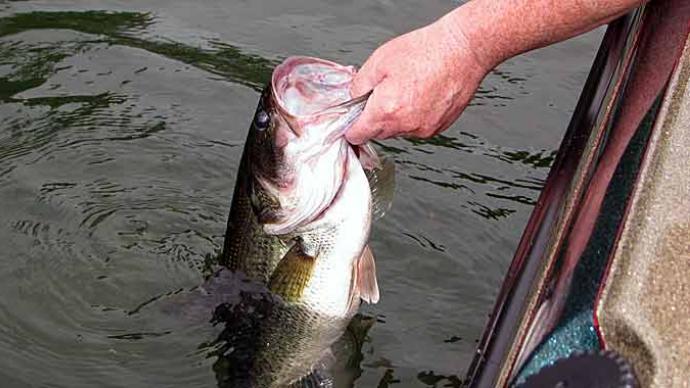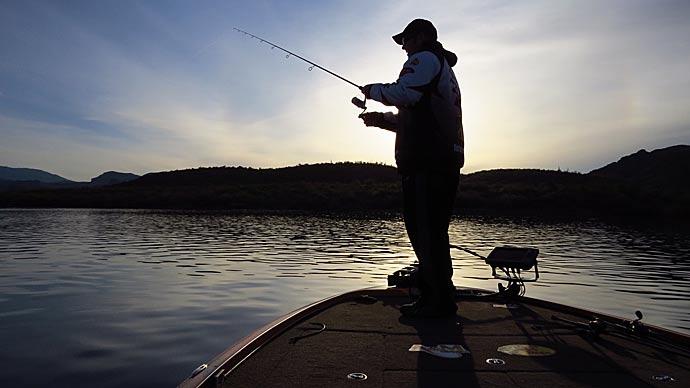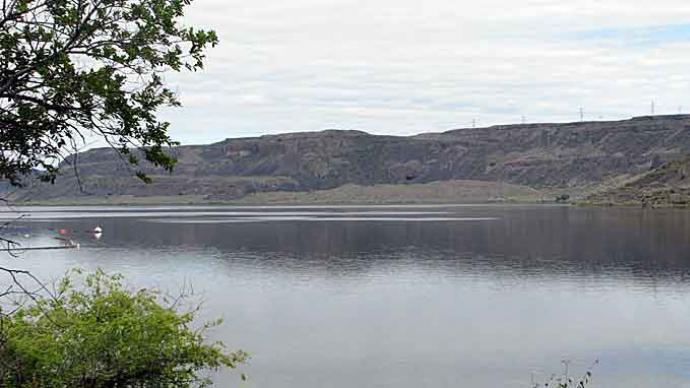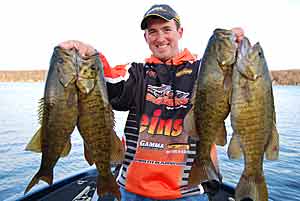
Paul Mueller has always loved to fish for bass. Their passion was ignited by his father, who took him on his first excursions. He religiously watched The Bassmasters on television. At age 16, he joined a local bass club and fished his first tournaments. Not long after, he entered larger ones — including those organized by the Connecticut B.A.S.S. Nation — that were farther from his home. “I fished all levels from the ground level up,” he said. “I always loved to compete.”
Mueller competed as a co-angler on the FLW Tour from 2008 to 2011, when he was crowned the co-angler champion at the Forrest Wood Cup on Lake Ouachita in Arkansas. He was a co-angler in the Rayovac FLW Series Northern Division in 2011 and then a boater in 2012 and 2013.
Mueller’s accomplishments in B.A.S.S.-sanctioned events stand as tall. He fished his way through the B.A.S.S. Nation ranks to its 2013 National Championship on Lake Dardanelle in Arkansas, where he was the top Eastern Division angler. That qualified him for the 2014 Bassmaster Classic on Alabama’s Lake Guntersville, where he weighed 66 pounds and 8 ounces and finished second. His second-day catch — five largemouth that weighed 32 pounds and 3 ounces — was the biggest limit of his life and set the current five-fish weight record for the Classic. He’ll return to the Bassmaster Classic in 2015 because he won the 2014 B.A.S.S. Nation Championship on the Ouachita River in Monroe, La.
But Guntersville and the other waters Mueller has found success are far — in distance and fishing approach — from the Northern fisheries closer to his hometown. “They fish unlike anything we have here in Connecticut,” he said. Tournament bass anglers earn the rank of best by finding prize-winning bass on any lake at any time. Mueller is one of those anglers. So how do you find bass in a lake? He shared the following five tips, so you can become better at finding bass on new-to-you lakes.
Understand the body of water
The search for bass starts before Mueller leaves his driveway. “I try to research the lake — patterns, depths,” he said. “The forage is a good thing to know, too.” Combining that information allows him to assemble expectations of what he’ll find and where he’ll start fishing. But he deems the next step more important: getting out on the water. That’s when he sees the lake’s layout and learns how to navigate it.
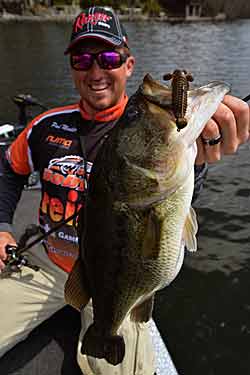
A new-to-you lake is not the place to experiment with new techniques. Mueller sticks with the basics, so he can concentrate on finding bass. That includes focusing on sections of a lake or river where he can fish his strengths. And your strength, he said, can often be an underutilized technique that has the potential to produce on that new lake. That’s what he found at Lake Dardanelle, the 34,000-acre Arkansas River impoundment about 1,400 miles from his home in Naugatuck, Conn.
Mueller qualified through local and state tournaments to represent his home state in the 2013 B.A.S.S. Nation Championship, just like the other competitors. But he only had to beat anglers from the other Eastern Division states to earn a Bassmaster Classic invite. He said most competitors were focused on shallow bass, casting spinnerbaits, bladed jigs, and jigs to shoreline grass. So he went the other way, flexing his strength with deep-diving crankbaits to find bass in deeper water. He was one of the only anglers there to fish that way.
Mueller used his crankbaits to find Dardanelle bass relating to small underwater points dotted with underwater coontail grass. He followed those bass as conditions changed during the tournament, and he ended up catching them from matted coontail and hyacinths along a deep bank with a Dobyns flipping stick, Reins Ring Craw, and 1.25-ounce weight. But he may not have found them in the first place if he hadn’t started with one of his strengths.
Cover water quickly
Switching from the cast-and-retrieve of crankbaits to the drop-and-wait of flipping wasn’t always for Mueller, who started as a power fisherman. But it was advice from a friend that drove home the importance of slowing down. He remembers well his words: “If you are going to make it in this business, you need to learn how to slow down and fish a jig.” Few other lures catch big fish and allow you to pick apart a spot better than a jig. But to find bass, you have to fish fast. Then once you find them, you can slow down and milk the biggest bass from a spot.
Mueller fishes fast because bass aren’t everywhere in a lake. They gravitate to the best cover and structure for the current conditions. He thinks the old saying that 90 percent of the fish are in 10 percent of the water is an overstatement, especially during the coldest months. He feels they are in an even smaller portion of available water. So when he is looking for bass, he keeps moving. That’s something he learned from his boaters during FLW Tour events. “Those guys fish so fast, but they are very efficient at it,” he said. “If you are not getting bites, you must move on.” He said that even spots that look perfect might not have as much potential as you think.
Mueller wants to find spots that produce keepers and better-sized bass. Both are key to cashing checks in tournaments. Those spots are easier to find on your home lake, he said, because of all the time you spend there. But on the road, you don’t have that luxury. He said the more water you cover, the faster you uncover productive patterns. Traditional power-fishing lures, such as crankbaits and spinnerbaits, cover water quickly. They help you find the critical depth, structure, and cover. But he has expanded his arsenal to include another search bait that combines speed and finesse: Reins 4-inch Rockvibe Shad. “It’s such a confidence bait,” he said. “I’ll rig it on a jig head and fish it deep.” He can swim it at any speed. He rigged it on a bladed jig to set the Classic record at Guntersville. He’ll even Texas rig it on a weightless hook and fish it like a frog across matted vegetation.
Success is in the details.
Mueller said the bass would expose themselves when you fish using the correct technique. It’s important to note all the details of each strike, such as retrieve speed, depth, structure, and cover. That way, you can duplicate what you did and catch more.
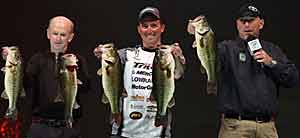
The more details you incorporate, the stronger the pattern you’ll develop. Those are the ones that allow you to call your shots. All it takes is one fish. That was the case at the 2014 B.A.S.S. Nation Championship. Mueller again walked away with an invitation to the Bassmaster Classic, but he also claimed first place overall this time. During the tournament, he planned to flip cypress trees and stumps in a backwater — Horseshoe Creek — when the sun was high and a distinct shade line developed.
That didn’t happen till about 9 a.m., so he started the first day with a square-bill crankbait, which produced a limit of bass that was culled by flipping fish later. But it was a giant fish (he’s not even sure it was bass) that he lost on the second day that provided a clue to make his crankbait pattern better. Away from each cypress tree were root clumps that rose off the bottom. Before the sun came up and bass went to the shady trunks, they would roam, some stopping to suspend around the clumps. He could deflect the square bill off them and generate strikes. That one bite he lost revealed the clumps’ potential. “When you get one bite,” he said, “you try to analyze it and look for similar areas.” When the water level changed and pushed more shad into the backwater on the last day, those roots played a crucial role in him catching enough to win.
Study the weather
The weather probably has the most significant effect on the day-to-day life of bass. “No matter where you are, the weather can change the position of the fish,” Mueller said. He feels that bass are on the move before a weather front hits. After it passes, bass become less active, with shallower ones snuggling tighter to cover and deeper ones moving deeper or suspending. He studies the local weather before he arrives at a body of water to help decide where to start and adjusts his fishing as the weather changes.
At the championship on the Ouachita River, Mueller found two spots. One was the backwater that he ultimately won. The other was a stretch of the main river, where he could catch quality bass on a buzzbait. The problem was they were far apart. There was no way to fish both in one tournament day. So he had to decide where to start.
But like any good tournament story, there was a twist. A front was forecasted to pass through the area on the tournament's first day, but he wasn’t sure when it would arrive or how long it would stay. “If I fished the buzzbait spot, it was going to be just one day, the first day,” he said. When he arrived at the boatyard the first morning, he abandoned any thought of fishing buzzbaits. “When I got off the bus, the air was cold,” he said. The front had arrived, killing the topwater bite. So he went flipping and cranking better post-frontal tactics. “If I did the buzzbait thing, I would have had a bad start and never been able to bounce back,” he said.
Keep an open mind
Mueller believes you need one thing above all the rest when searching for bass. “The thing is this: You always have to keep an open mind,” he said. “The more you fish, the more of an instinct you develop.” That allows you to analyze all the variables, ruling out what isn’t working and building off what is. “Even as much technology as we have nowadays, there are still secrets to be uncovered,” he said. “Sometimes, I learn more from what I didn’t do.” He’ll apply those lessons toward future tournaments and recommends keeping detailed notes if needed to remember conditions and tactics. “I’m the type of person that when I learn something, I’ll never forget it,” he said. “My fishing memory is good, but I’m not sure about my regular memory.”
Mueller is now 30 years old. He’ll soon apply everything he has learned about finding bass to Lake Hartwell, the Savannah River impoundment along the Georgia-South Carolina line site of the 2015 Bassmaster Classic. He’s researching it now and assembling a plan. And like before, he’s learning about the primary forage, which in Lake Hartwell is blueback herring. Their nomadic tendencies will twist his search for what he believes will be prespawn bass.
He’ll continue to apply his approach to finding bass when he competes in the 2015 Bassmaster Elite Series. “I’m excited,” he said. It will be challenging to keep pace with the other competitors, who he says are all great anglers who can find bass anywhere and anytime. He’ll combat that by searching out his comfort zone on each of the bodies of water.
He’s already gathering information and looking at the waters on Google Earth. He’s never been to some of them — California Delta, Lake Havasu, Sabine River — and has limited experience on some of the others — Lake St. Clair and Kentucky Lake. He said they all have good bass populations, and the series will be visiting at the best time for each. “They have a great schedule. It’s going to be an exciting year.”
BassResource may receive a portion of revenues if you make a purchase using a link above.


